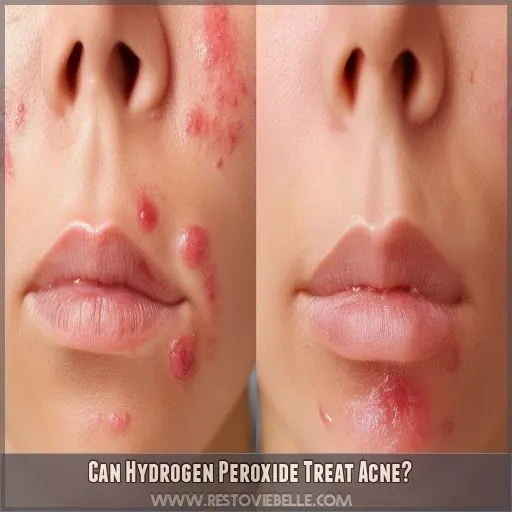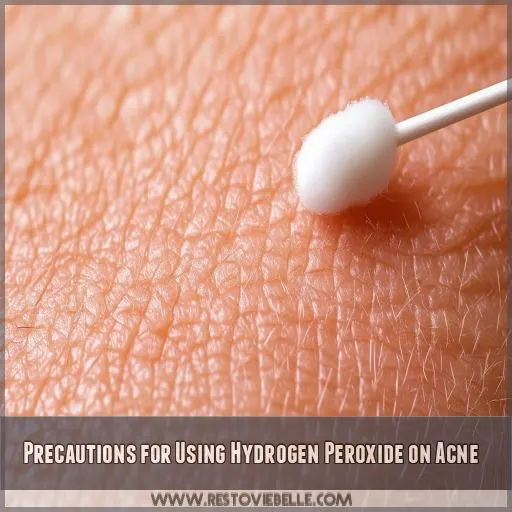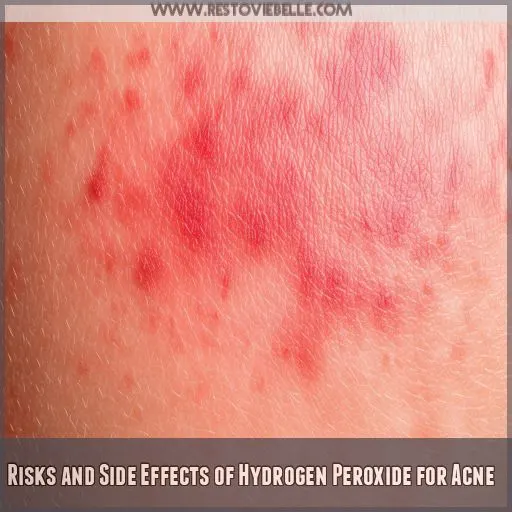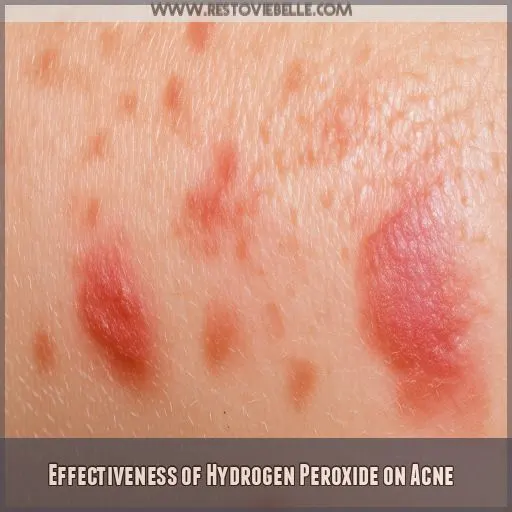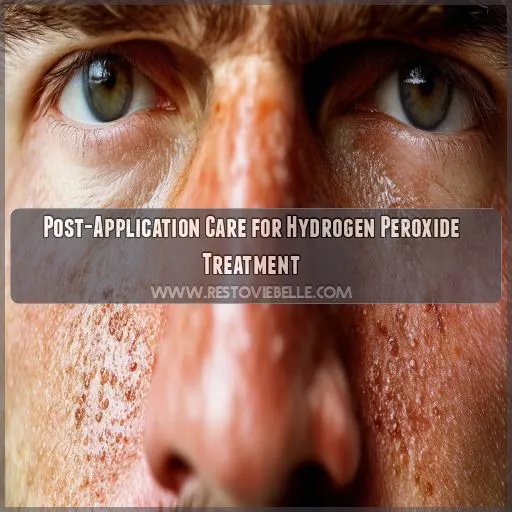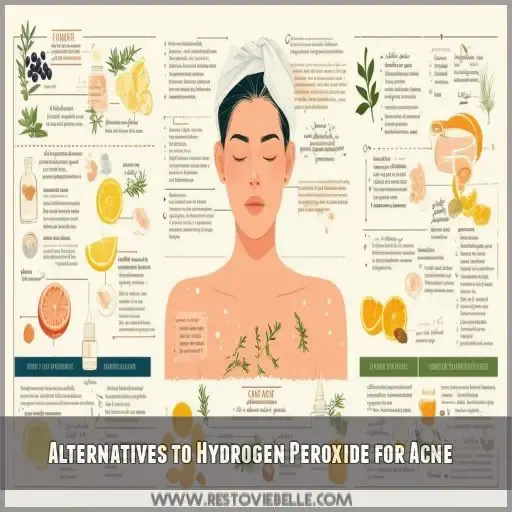This site is supported by our readers. We may earn a commission, at no cost to you, if you purchase through links.
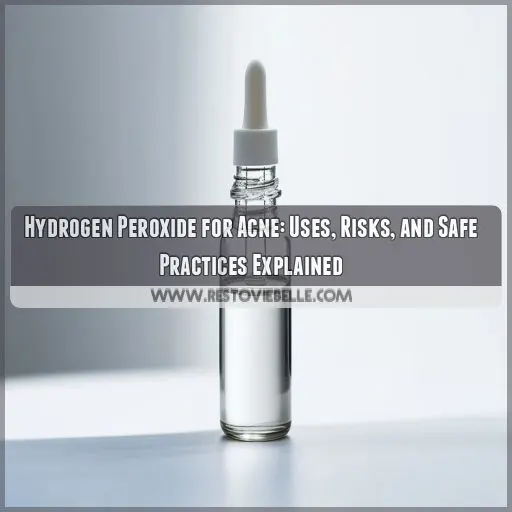 Although hydrogen peroxide is very commonly used as a household disinfectant, its use in relation to acne treatment is frequently touted.
Although hydrogen peroxide is very commonly used as a household disinfectant, its use in relation to acne treatment is frequently touted.
Is this inexpensive, antibacterial solution at all effective for clearing up skin, or are there major risks involved?
This article will walk you through using hydrogen peroxide for acne while emphasizing precautions and side effects that could arise. You will find out about its effectiveness and get information on other safer alternatives.
You will explore if hydrogen peroxide is your skin’s friend or its foe.
Table Of Contents
- Key Takeaways
- How to Use Hydrogen Peroxide for Acne?
- Can Hydrogen Peroxide Treat Acne?
- Precautions for Using Hydrogen Peroxide on Acne
- Risks and Side Effects of Hydrogen Peroxide for Acne
- Effectiveness of Hydrogen Peroxide on Acne
- Post-Application Care for Hydrogen Peroxide Treatment
- Alternatives to Hydrogen Peroxide for Acne
- Frequently Asked Questions (FAQs)
- Can I use hydrogen peroxide on a pimple?
- How long does it take for hydrogen peroxide to lighten dark spots?
- Can you clean your pores with peroxide?
- How long will my skin be white from hydrogen peroxide?
- Can hydrogen peroxide cause skin allergies?
- What skin types should avoid hydrogen peroxide?
- Are there natural alternatives to hydrogen peroxide?
- How does hydrogen peroxide compare to commercial acne treatments?
- What concentration is safe for hydrogen peroxide use?
- Conclusion
Key Takeaways
Hydrogen peroxide for acne? Think twice! It’s like playing with fire – you might end up with more damage than you started with.
If you’re looking for a safe and effective acne solution, there are plenty of fish in the sea – try benzoyl peroxide or salicylic acid instead.
If you’re still tempted to give hydrogen peroxide a shot, start with a diluted solution and keep a close eye on your skin. If it starts acting up, it’s time to wave goodbye to hydrogen peroxide and find a gentler alternative.
How to Use Hydrogen Peroxide for Acne?
To use hydrogen peroxide for acne**, start by ensuring you use a 1-3% solution to avoid skin irritation. Cleanse your face, then apply the hydrogen peroxide to a cotton pad and gently dab it on affected areas.
Rinse thoroughly with cold water and moisturize to prevent dryness. Limit treatments to 2-3 times a week and always avoid sensitive regions like eyes and lips.
Beware of side effects such as redness and burns, and consider consulting a dermatologist before starting. If you’re curious about better, proven acne treatments, keep exploring further information!
Can Hydrogen Peroxide Treat Acne?
Hydrogen peroxide can treat acne by releasing oxygen atoms that create an antibacterial environment on your skin. To use, apply a 1% diluted solution to affected areas for five minutes before rinsing it off.
Mechanism of Action
Hydrogen peroxide for acne boasts antibacterial properties, exfoliation effects, and a potential impact on wound healing. Its mechanism includes:
- Releasing Oxygen: Oxygenation creates an antibacterial environment, killing germs and bacteria.
- Exfoliation: Helps slough off dead skin cells, unclogging pores.
- Skin Damage: May harm healthy skin cells, increasing scar formation and skin damage risks.
Application Method
To use hydrogen peroxide for acne, first cleanse your face thoroughly. Then, dilute the peroxide to a 1% concentration and apply it to the affected areas using a cotton ball. Leave it on for 5 minutes before rinsing it off completely. Repeat this 2-3 times per week, adjusting the frequency based on your skin type.
| Dilution | Application Duration | Skin Types |
|---|---|---|
| 1% | 5 minutes | Oily, acne-prone |
| 3% | 2-3 minutes | Sensitive, dry |
| 6% | Spot treatment only | Combination |
Combining hydrogen peroxide with baking soda can create an effective spot treatment for acne. Always remember to thoroughly rinse and moisturize after using this powerful skin disinfectant.
Precautions for Using Hydrogen Peroxide on Acne
While treating acne with hydrogen peroxide, safe concentrations should be used between 1-3% since higher ones might lead to serious skin damage. Always go for over-the-counter status, avoiding industrial grade and products having as much as up to 90 percent concentration.
Safe Concentrations
Hydrogen peroxide, when used for acne, should be at safe concentrations, ideally around 1%. Higher concentrations increase risks, such as skin irritation and burns. Avoid industrial versions, which may contain up to 90%. Over-the-counter (OTC) products offer safer options, usually at 3%. Always dilute and rinse thoroughly to minimize adverse effects.
OTC Vs. Industrial Versions
In the use of hydrogen peroxide for acne, one must be very clear about both over-the-counter and industrial strength. For example, with the over-the-counter solution, it typically contains 3 percent safe concentration, whereas in the case of industrial versions, this goes as high as 90 percent way too strong for application on the skin. Always check the labels and consult a dermatologist prior to using any hydrogen peroxide product.
- Hydrogen peroxide content in OTC products is 3%
- The industrial versions reach as high as 90% concentration.
Consult a dermatologist before using any hydrogen peroxide product.
- Avoid industrial strength hydrogen peroxide on skin
- Compare the prices and strengths available OTC vs. industrial versions
Risks and Side Effects of Hydrogen Peroxide for Acne
Hydrogen peroxide treatment for acne poses a significant risk for skin irritation and even toxic reactions with product misuse. There’s a huge chance of burns, blisters, or delayed healing; hence it’s worthwhile considering some other and far safer alternatives like benzoyl peroxide or salicylic acid.
Skin Irritation
Using hydrogen peroxide on acne can lead to skin irritation, including redness, itching, and dermatitis. Possible side effects may also include skin allergies, burns, and hyperpigmentation. It can damage healthy cells and slow wound healing. Always use with caution and follow safe practices.
| Symptom | Cause | Risk |
|---|---|---|
| Redness | Inflammation | Medium |
| Itching | Allergic Reaction | Medium |
| Dermatitis | Chemical Irritation | High |
| Burns | High Concentration Usage | High |
| Hyperpigmentation | Post-Inflammatory Changes | Medium |
Toxicity
Hydrogen peroxide’s toxicity is a serious concern. Ingesting or inhaling high concentrations can lead to internal organ damage or even fatality. Eye exposure may also cause permanent eye damage. To stay safe, always use hydrogen peroxide as directed and avoid contact with sensitive areas. Consult a doctor if you experience any adverse reactions.
- Toxicity from ingestion or inhalation
- Risk of internal organ damage
- Potential for eye damage
Effectiveness of Hydrogen Peroxide on Acne
There is no proof of the effectiveness of hydrogen peroxide in acne; moreover, it might further destroy healthy skin cells needed during the process of healing. You should consider alternatives like benzoyl peroxide or salicylic acid for a safer, more reliable treatment.
Alternatives for Acne Treatment
When looking for alternatives to hydrogen peroxide for acne, consider options like salicylic acid, tea tree oil, sulfur, retinoids, antibiotics, and Vitamin C. These alternatives can be more effective and safer. For spot treatment, use baking soda with a cotton ball or pad. Always consult a dermatologist for persistent acne issues.
| Ingredient | Type | Application |
|---|---|---|
| Salicylic Acid | Exfoliator | Clean face, apply |
| Tea Tree Oil | Natural Antiseptic | Spot treatment |
| Sulfur | Anti-inflammatory | Mask, wash |
| Retinoids | Vitamin A Derivative | Creams, serums |
Ineffectiveness and Risks
Hydrogen peroxide may not be as effective for acne as you’d hope. It can actually damage healthy skin cells needed for healing. Plus, it carries risks like skin irritation, burns, and even toxicity if misused. Instead, try gentler options like benzoyl peroxide, salicylic acid, or alpha-hydroxy acids to tackle acne without the potential downsides.
- Hydrogen peroxide isn’t proven effective for treating acne or lightening skin.
- It may damage healthy skin cells needed for healing.
- Alternatives like benzoyl peroxide, salicylic acid, and alpha-hydroxy acids are gentler and more effective.
Post-Application Care for Hydrogen Peroxide Treatment
After applying hydrogen peroxide to treat acne, rinse your face thoroughly with cold water and gently pat it dry. Follow up with a moisturizer to keep your skin hydrated and mitigate dryness; repeat the treatment 2-3 times a week, reducing frequency if you have dry skin.
Rinse and Moisturize
After using hydrogen peroxide for acne, rinse your face with cold water to minimize skin sensitivity and remove any residue. Then, pat your skin dry and apply a gentle moisturizer to restore hydration levels. This step helps reduce post-treatment redness and irritation. Choose moisturizers suited to your skin type, avoiding products with potential irritants like fragrances or harsh chemicals.
Frequency of Treatment
To get the most out of your hydrogen peroxide acne treatment, apply it 2-3 times per week, adjusting as needed for your skin’s sensitivity. OTC products contain safe 3% concentrations, while higher industrial versions can be dangerous. Consider alternative acne treatments like benzoyl peroxide or salicylic acid if hydrogen peroxide causes irritation or fails to improve your skin.
Here are 3 key tips for using hydrogen peroxide safely and effectively:
- Start with lower concentrations and gradually increase if tolerated.
- Discontinue use if you experience excessive dryness, redness, or burning.
- Avoid using hydrogen peroxide near sensitive areas like eyes, nose, and internal organs.
Alternatives to Hydrogen Peroxide for Acne
For more effective and safer acne treatments, consider alternatives like benzoyl peroxide and salicylic acid. These options are clinically proven, widely available, and less harmful to your skin than hydrogen peroxide.
Benzoyl Peroxide
Benzoyl peroxide is a powerful alternative for acne, effectively targeting bacteria and reducing inflammation. It forms a protective film on the skin, providing consistent treatment. Safe and widely available, it comes in various concentrations. Unlike hydrogen peroxide, it offers notable results without excessive risk of irritation, making it a top choice for managing acne.
Salicylic Acid
Salicylic acid is another effective acne-fighting ingredient you can try. It’s an exfoliant that helps unclog pores, reduce inflammation, and dry out blemishes. Look for salicylic acid products in:
- Cleansers
- Spot treatments
- Leave-on treatments
Salicylic acid is a great alternative to hydrogen peroxide, providing a gentler approach to managing acne without the risks of skin irritation or damage.
Frequently Asked Questions (FAQs)
Can I use hydrogen peroxide on a pimple?
You can use a diluted hydrogen peroxide solution (1%) on a pimple, but be cautious – it may dry out and irritate your skin. For safer acne treatment, try benzoyl peroxide or salicylic acid instead.
How long does it take for hydrogen peroxide to lighten dark spots?
Coincidentally, you might notice hydrogen peroxide starting to lighten dark spots within a few weeks. However, its effectiveness isn’t proven. Safer alternatives like alpha-hydroxy acids or vitamin C are recommended for better results.
Can you clean your pores with peroxide?
You can clean your pores with hydrogen peroxide, but it’s not recommended. It can damage skin cells, slow healing, and lead to irritation or scarring. Consider safer, more effective alternatives like salicylic acid or benzoyl peroxide.
How long will my skin be white from hydrogen peroxide?
Your skin may appear temporarily white or bleached after using hydrogen peroxide, but this effect typically fades within 15-30 minutes as the chemical reaction subsides. Rinse thoroughly and moisturize to minimize any lingering whiteness.
Can hydrogen peroxide cause skin allergies?
Yes, hydrogen peroxide can cause skin allergies. Symptoms include redness, itching, hives, and irritation. If you experience any of these reactions, stop using it immediately and consult a healthcare professional for guidance.
What skin types should avoid hydrogen peroxide?
If you have sensitive, dry, or eczema-prone skin, you should avoid using hydrogen peroxide. It can cause more irritation, damage healthy skin cells, and worsen your overall skin condition.
Are there natural alternatives to hydrogen peroxide?
Embrace the power of nature’s remedies! Salicylic acid, tea tree oil, and sulfur offer effective, gentle alternatives to harsh hydrogen peroxide for managing acne. Discover the soothing relief these natural solutions can provide for your skin.
How does hydrogen peroxide compare to commercial acne treatments?
Hydrogen peroxide isn’t as effective for acne as commercial treatments like benzoyl peroxide or salicylic acid. It can damage skin and slow healing. Stick with proven treatments that offer better results and fewer risks.
What concentration is safe for hydrogen peroxide use?
For safe use, hydrogen peroxide should be diluted to a 1% concentration. Higher concentrations can harm your skin, causing irritation, burns, and slow wound healing. Always use caution and avoid contact with eyes or hair.
Conclusion
Ultimately, while hydrogen peroxide may seem like an inexpensive and convenient acne treatment, the risks often outweigh the potential benefits. Sarah, a 22-year-old with persistent acne, learned this the hard way after using a high concentration solution, which led to severe skin irritation and dryness.
To safely and effectively treat acne, it’s best to explore gentler, clinically-proven alternatives like benzoyl peroxide or salicylic acid. Proper use of hydrogen peroxide for acne requires caution, and even then, it may not be the most reliable or effective solution.

